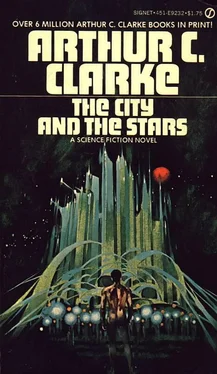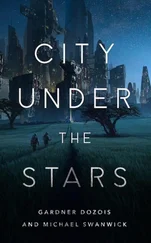Alvin was surprised that anyone should ask so elementary a question, and his hopes of learning something new began to wane.
«Through the Memory Banks, of course,» he replied. «Diaspar is always composed of the same people, though their actual groupings change as their bodies are created or de-stroyed.»
Khedron shook his head. «That is only a very small part of the answer. With exactly the same people, you could build many different patterns of society. I can’t prove that, and I’ve no direct evidence of it, but I believe it’s true. The designers of the city did not merely fix its population; they fixed the laws governing its behavior. We’re scarcely aware that those laws exist, but we obey them. Diaspar is a frozen culture, which cannot change outside of narrow limits. The Memory Banks store many other things outside the patterns of our bodies and personalities. They store the image of the city itself, holding its every atom rigid against all the changes that time can bring. Look at this pavement-it was laid down millions of years ago, and countless feet have walked upon it. Can you see any sign of wear? Unprotected matter, however adamant, would have been ground to dust ages ago. But as long as there is power to operate the Memory Banks, and as long as the matrices they contain can still control the patterns of the city, the physical structure of Diaspar will never change.»
But there have been some changes,» protested Alvin. «Many buildings have been torn down since the city was built, and new ones erected.»
«Of course-but only by discharging the information stored in the Memory Banks and then setting up new patterns. In any case, I was merely mentioning that as an example of the way the city preserves itself physically. The point I want to make is that in the same way there are machines in Diaspar that preserve our social structure. They watch for any changes, and correct them before they become too great. How do they do it? I don’t know-perhaps by selecting those who emerge from the Hall of Creation. Perhaps by tampering with our personality patterns we may think we have free will, but can we be certain of that?»
«In any event, the problem was solved. Diaspar has survived and come safely down the ages, like a great ship carrying as its cargo all that is left of the human race. It is a tremendous achievement in social engineering, though whether it is worth doing is quite another matter.
«Stability, however, is not enough. It leads too easily to stagnation, and thence to decadence. The designers of the city took elaborate steps to avoid this though these deserted build-ings suggest that they did not entirely succeed. I, Khedron the Jester, am part of that plan. A very small part, perhaps. I like to think otherwise, but I can never be sure.»
«And just what is that part?» asked Alvin, still very much is the dark, and becoming a little exasperate.
«Let us say that I introduce calculated amounts of disorder into the city. To explain my operations would be to destroy their effectiveness. Judge me by my deeds, though they are few, rather than my words, though they are many.»
Alvin had never before met anyone quite like Khedron. The Jester was a real personality-a character who stood head and shoulders above the general level of uniformity which was typical of Diaspar. Though there seemed no hope of discovering precisely what his duties were and how he carried them out, that was of minor importance. All that mattered, Alvin sensed, was that here was someone to whom he could talk-when there was a gap in the monologue-and who might give him answers to many of the problems that had puzzled him for so long.
They went back together down through the corridors of the Tower of Loranne, and emerged beside the deserted moving way. Not until they were once more in the streets did it occur to Alvin that Khedron had never asked him what he had been doing out here at the edge of the unknown. He suspected that Khedron knew, and was interested but not surprised. Something told him that it would be very difficult to surprise Khedron.
They exchanged index numbers, so that they could call each other whenever they wished. Alvin was anxious to see more of the Jester, though he fancied that his company might prove exhausting if it was too prolonged. Before they met again, however, he wanted to find what his friends, and particularly Jeserac could tell him about Khedron.
«Until our next meeting,» said Khedron, and promptly vanished. Alvin was somewhat annoyed. If you met anyone when you were merely projecting yourself, and were not present in the flesh, it was good manners to make that clear from the beginning. It could sometimes put the party who was ignorant of the facts at a considerable disadvantage. Probably Khedron had been quietly at home all the time wherever his home might be. The number that he had given Alvin would insure that any messages would reach him, but did not reveal where he lived. That at least was according to normal custom. You might be free enough with index numbers, but your actual address was something you disclosed only to your intimate friends.
As he made his way back into the city, Alvin pondered over all that Khedron had told him about Diaspar and its social organization. It was strange that he had met no one else who had ever seemed dissatisfied with their mode of life. Diaspar and its inhabitants had been designed as part of one master plan; they formed a perfect symbiosis. Throughout their long lives, the people of the city were never bored. Though their world might be a tiny one by the standard of earlier ages, its complexity was overwhelming, its wealth of wonder and treasure beyond calculation. Here Man had gathered all the fruits of his genius, everything that had been saved from the ruin of the past. All the cities that had ever been, so it was said, had given something to Diaspar; before the coming of the Invaders, its name had been known on all the worlds that Man had lost. Into the building of Diaspar had gone all the skill, all the artistry of the Empire. When the great days were coming to an end, men of genius had remolded the city and given it the machines that made it immortal. Whatever might be forgotten, Diaspar would live and bear the descendants of Man safely down the stream of time.
They had achieved nothing except survival, and were content with that. There were a million things to occupy their lives between the hour when they came, almost full-grown, from the Hall of Creation and the hour when, their bodies scarcely older, they returned to the Memory Banks of the city. In a world where all men and women possess an intelligence that would once have been the mark of genius, there can be no danger of boredom. The delights of conversation and argument, the intricate formalities of social intercourse these alone were enough to occupy a goodly portion of a lifetime. Beyond those were the great formal debates, when the whole city would listen entranced while its keenest minds met in combat or strove to scale those mountain peaks of philoso-phy which are never conquered yet whose challenge never palls.
No man or woman was without some absorbing intellectual interest. Eriston, for example, spent much of his time in prolonged soliloquies with the Central Computer, which virtually ran the city, yet which had leisure for scores of simultaneous discussions with anyone who cared to match his wits against it. For three hundred years, Eriston had been trying to construct logical paradoxes which the machine could not resolve. He did not expect to make serious progress before he had used up several lifetimes.
Etania’s interests were of a more esthetic nature. She designed and constructed, with the aid of the matter organi-zers, three-dimensional interlacing patterns of such beautiful complexity that they were really extremely advanced prob-lems in topology. Her work could be seen all over Diaspar, and some of her patterns had been incorporated in the floors of the great halls of choreography, where they were used as the basis for evolving new ballet creations and dance motifs.
Читать дальше












